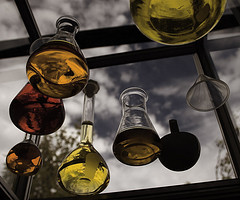
 Most of us, in the jobs we have, are familiar with handbooks. We’ve probably failed to read them, as they’re not filled with the most intriguing material, but nevertheless, we’re aware that they present guidelines we’re supposed to follow while working with our employers.
Most of us, in the jobs we have, are familiar with handbooks. We’ve probably failed to read them, as they’re not filled with the most intriguing material, but nevertheless, we’re aware that they present guidelines we’re supposed to follow while working with our employers.
Cosmetic manufacturers have such a handbook as well. It’s provided by the FDA, the organization that regulates the making of cosmetics, and it’s called the FDA Cosmetics Handbook. If you happen to browse through it (you’re probably holding your breath in anticipation of getting your hands on one), you’ll read a few things you might not have expected to read. Like this quote, for instance:
“With the exception of color additives and a few prohibited ingredients, a cosmetic manufacturer may, on his own responsibility, use essentially any raw material as a cosmetic ingredient and market the product without approval.”
Huh? Any raw material?
Let’s put this in terms most of us can understand. We’ll imagine that we all work in a restaurant. It’s called “Taking Chances.” If this restaurant had an employee handbook similar to the FDA Cosmetic Handbook, it might read something like this: “With the exception of ammonia and a few other prohibited things, a cook may, on his own responsibility, use essentially anything he wants to make the meals and serve them, without manager approval.”
Laughable, right? How many times would you eat at an establishment like that?
Granted, most skin-care manufacturers try to be “responsible,” and certainly they strive to make quality products so we’ll keep buying them. But there are some concerning ingredients that show up in formulas at low amounts that are known to be potential carcinogens. Some are cheaper to use, so the manufacturers stick with them. Others are by-products of manufacturing, and would cost money to take out. Many times they’re present in trace amounts, so who’s really going to notice?
Consider this: Would you want that cook at Taking Chances to drop even a trace amount of super glue into your mashed potatoes?
One of those toxic ingredients is dioxane, permissible by the FDA and irritating to the eyes and mucous membranes. It’s a by-product of manufacturing and has even shown up in baby shampoos. When lab animals were tested with it, they developed cancer. Nitrosamines are known carcinogens, yet with the FDA’s blessing, they show up in creams, lotions, and hair conditioners. Even mercury-an extremely toxic, poisonous compound-is permitted at certain levels by the FDA for use as a preservative when other options aren’t available.
We probably aren’t going to contract disease by using one of these products once or twice. The problem is, we all use personal-care products like shampoo, conditioner, bath gel, soap, moisturizer, lotion, shave creams, and hair-styling products several times a day most days of the year for our entire lives, which can be up to 80 years or more, if we’re lucky. No one’s studied the effect of these chemicals on the human body for that long. Meanwhile, cancer diagnoses continue to rise. Shouldn’t the FDA take a bigger responsibility in protecting us?
If you were a customer at Taking Chances, wouldn’t you demand a new handbook, or refuse to frequent the place anymore?
What do you think of the current lack of FDA oversight into cosmetics? Please share your opinions.
Photo courtesy of Lazy Aussie via Flickr.com.

